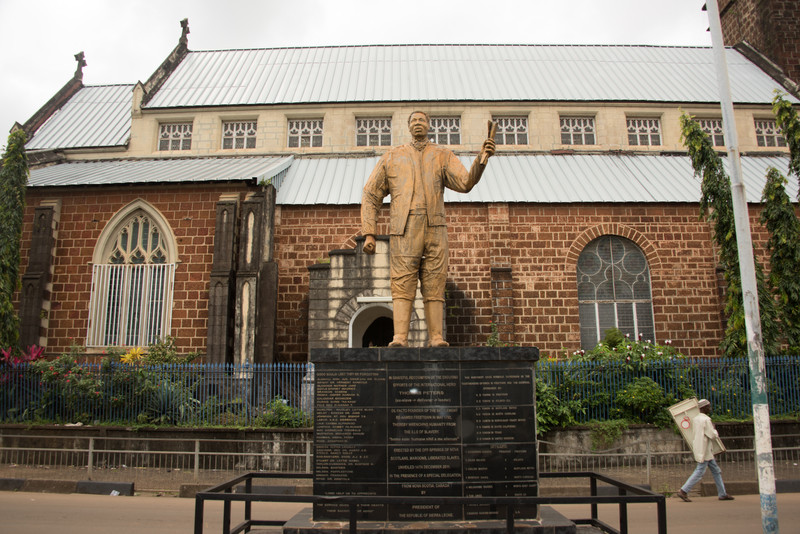Thomas Peters National Historic Person (c. 1738–1792)
Thomas Peters was designated a national historic person in 2022.
Historical importance: Yoruba man who escaped enslavement in North Carolina to fight as a Loyalist, fought for Black Loyalists rights.
Commemorative plaque: No plaque installedFootnote 1

© Afrique Photos
Thomas Peters (c. 1738–1792)
A West African-born Yoruba man, Thomas Peters escaped enslavement in North Carolina to fight on the side of Britain during the American Revolutionary War as a sergeant in the Black Pioneers. He became a prominent leader and influential spokesperson for the Black Loyalists who were frustrated and disillusioned by the conditions of their postwar resettlement in Nova Scotia and New Brunswick. Peters fought tirelessly for land grants and provisions, criticizing British officials for failing to fulfill promises made to Black Loyalists in a series of petitions that culminated in a mass migration to the West African colony of Sierra Leone in 1792. Peters recruited roughly a third of the estimated 1,196 people of African descent who relocated to Sierra Leone and founded the settlement of Freetown. There, he continued to lead their fight for land, liberty, and self rule until his death.
Few details are known about the early life of Thomas Peters (Petters), who is believed to have been born around 1738 to a noble Yoruba family in what is now Nigeria. He was among the many Yoruba captured and forcibly transported to the Americas in the most inhumane conditions during the centuries-long Atlantic slave trade. He was enslaved first in French Louisiana in 1762 and then in the British colony of North Carolina. After escaping enslavement on a plantation in 1776, he joined the Black Pioneers in New York, rising to the rank of sergeant while fighting on the side of Britain during the American Revolutionary War (1775–1783). After the war, Thomas Peters, his wife, Sally (Salley), their young daughter, Clairy (Clara), and infant son, John, were among the estimated 3,500 Black Loyalists evacuated by the British to Nova Scotia.
When they did not receive the rations and land promised to them by the British, Thomas Peters and fellow sergeant in the Black Pioneers, Murphy Still (Steele or Stiele), became the first Black Loyalists in Nova Scotia to petition the government for promised land and provisions, making their initial appeal to Governor John Parr in August 1784 on behalf of Black Loyalists in Digby. Following two more petitions, the Peters family and 75 other Black Loyalist households received one-acre (0.4-hectare) town lots in nearby Brindley Town in 1785. However, they were not granted enough fertile land to subsist by farming. Peters subsequently left Nova Scotia for New Brunswick, but quickly discovered that conditions were no better in the newly established British colony. With few provisions and almost no fertile land, many Black Loyalists had no choice but to survive by working as day labourers, becoming sharecroppers, or indenturing themselves to colonists of European descent.
Disillusioned and frustrated with life in the colonies of Nova Scotia and New Brunswick, 202 Black Loyalists in Annapolis County and Saint John deputed Peters to petition the British government on their behalf in 1790. He travelled to London to make an impassioned appeal for justice, racial equality, and land, explaining that they were “ready and willing to go wherever the Wisdom of Government may think proper to provide for them as free Subjects of the British Empire.” While in London, he learned that the Sierra Leone Company was looking to establish a permanent settlement of formerly enslaved people of African descent from the Americas. Peters went on to play a leading role in the recruitment of Black Loyalists in Nova Scotia and New Brunswick for resettlement in the West African colony. Ultimately, 1,196 Black Loyalists left Halifax for Sierra Leone aboard a fleet of 15 ships in January 1792. Peters lived the new settlement of Freetown until his death later that year. The people he helped settle there are remembered today in Freetown as the “Nova Scotians.”
This press backgrounder was prepared at the time of the Ministerial announcement in 2023.
The National Program of Historical Commemoration relies on the participation of Canadians in the identification of places, events and persons of national historic significance. Any member of the public can nominate a topic for consideration by the Historic Sites and Monuments Board of Canada.
- Date modified :